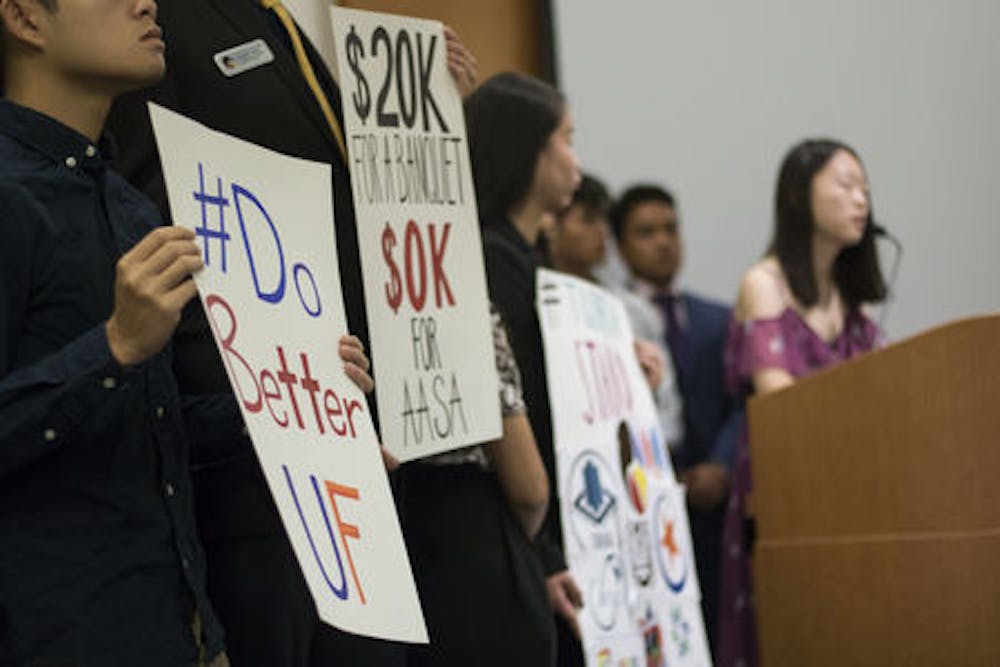Nine of UF’s largest student organizations are demanding action after of recent changes to their funding system following the Young Americans for Freedom’s $66,000 lawsuit against UF.
The lawsuit requires UF Student Government to develop a new funding system for all student organizations, which changed budgets of the “Big Nine” –– the largest student body organizations –– and all other organizations funded by SG, said Hispanic Student Association president Isabella Oliver.
“It’s been very difficult trying to navigate the new system,” Oliver said. “There are other events we haven’t been able to fund because they ran out before we even put in the request.”
The UF chapter of Young Americans for Freedom sued UF, claiming its first and 14th amendment rights were violated by not having access to student activity funds to pay for speakers.
This reallocation of funds affect the organizations’ ability to cosponsor their sub-organizations, such as welcome assemblies held at the beginning of each semester, forcing a series of adjustments and scrambling for new fund sources.
Organizations such as the Black Student Union and Asian American Student Union have been affected by the reallocation of funds following the lawsuit. These organizations were forced to break apart from their sub-organizations. Many did not have the money to pay for a space to host welcome assemblies.
Representatives from the Black Student Union, Asian American Student Union and Pride Student Union condemned the new funding system Aug. 8 in front of the Senate during public comment.
Eliana Guerrero, the president of Asian American Student Union, told The Alligator the organization couldn’t get its funding request for the welcome assembly submitted early enough because it was partnering with the Asian American Student Association and its Freshman Leadership Program to fund the event.
The Asian American Student Assembly and Freshman Leadership Program’s new member approval forms weren’t approved until July 17, two days after the allocations committee ran out of funding for requests.
Guerrero said both the Asian American Student Union and their sub-organization, the Asian American Student Association, use the Phillips Center as a space for their welcome assembly, which costs $10,000 to rent.
The new 800 codes state that one event can only cost up to $5,000, making co-sponsorship for funding for the space impossible. Inspire Party Senator Zachariah Chou wrote a bill that would transfer $800,000 from SG reserves to help pay for assemblies and additional events by the organizations that may not be able to occur, Guerrero said.
“We had to make a whole other organization for our welcome assembly,” Guerrero said. “We were going to do a cosponsorship where AASU was going to give $5,000 and AASA was going to give $5,000.”
However, the organization has raised enough money to hold its welcome assembly in the Phillips Center through its GoFundMe page and community donations. The group officially announced the location on Tuesday, Guerrero said.
The situation could have been rectified if the Allocation Committee was more communicative in the beginning, Guerrero said.
“I just think [the Allocation Committee] should’ve set aside money in the beginning for welcome assemblies, or they shouldn’t have let people have access to the money until all new organizations were approved,” Guerrero said.
Currently, only 59 of 400 organizations received funding with this new system in place, Guererro said. The Black Student Union lost funding for their welcome assembly in the Phillips Center, forcing them to relocate to the University Auditorium.
Many of these organizations now lack a space for general body meetings and cannot fund events and speakers.
Since the restructuring of the funding system, organizations including Pride
Student Union and Women’s Student Association no longer have free access to the space in Ustler Hall, UF’s Center for Gender Studies and Women’s Research, said Pride Student Union president Nate Quinn.
Quinn expressed his concern over the organization’s lack of a meeting space and lack of funding for their Pride History Week speaker Schuyler Bailar, the first openly transgender Division I athlete.
“I personally don’t believe that this system is equitable,” Quinn said. “In the past, Big Nine has been given a lot of money to provide safe spaces to marginalized students.”
Other Big Nine leaders such as Women’s Student Association President Michaela Poitevien believe in order for SG to make progress on the whole, they to move toward equity versus equality.
The executive board members are working together to raise awareness of what is happening.
Poitevien said people in “Big Five” –– Women’s Student Association, Pride Student Union, Hispanic Student Association, Asian American Student Association and Black Student Union –– have all come together as a community to find solutions on how to continue their work to further their accomplishments for minority students.
“I would just like to commend all of the organizations for supporting each other, sharing each other’s GoFundMe’s and bringing awareness to the situation,” Poitevien said.
Khanh Hoang, 20, holds a protest sign alongside other protesters while Wenxin Song speaks during a Student Government Senate meeting in the Reitz chamber room Tuesday evening. Song is the Internal Vice President for the Korean Undergraduate Student Association. “It’s more than just a show,” Song said. “It is our tradition and our legacy here.”






